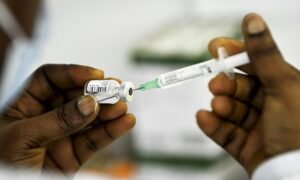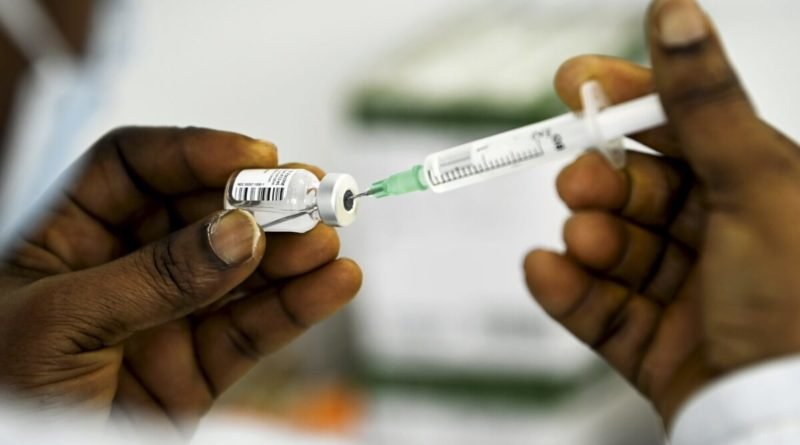Preventing COVID-19 Vaccine Adverse Events: Doctors Give Suggestions

Due to mandated vaccinations in his workplace, Mitchell McConachy, age 25, reluctantly took the jab in 2021. Since then, he has been worrying about adverse events.
In 2022, McConachy learned about COVID-19 vaccine adverse events from doctors online and realized his bouts of chest pain and throbbing in his head and wrists might have been attributed to the mRNA shots. He became increasingly concerned that these symptoms might precipitate something direr.
McConachy’s experience echoes one of many vaccinated people who are now concerned about potential vaccine risks. Some people didn’t experience any symptoms, but still worry that misfortune will fall on their heads someday in the future.
The Rasmussen Reports poll of 1,000 people in December 2022 showed that 57 percent of Americans are somewhat or very concerned about major vaccine adverse effects.
Yet there are options besides concern and worry. Doctors who are treating people who have likely experienced vaccine side effects said that for the many who have not experienced any symptoms but are concerned, there may be recourse to prevent these effects.
Not Everyone Will Experience Vaccine Adverse Events
Not everyone who is vaccinated will experience an adverse event. This depends on a multitude of factors including the person’s health, dosage, number of doses, and time since the last dose.
In relation to vaccine quality, studies have shown that vaccine batches are not made equal, with varying quality across batches. The website HowBadIsMyBatch.com demonstrates this, showing that the number and severity of adverse events vary across different batch numbers.
The amount of time since the last dose may also be a good assessment of the risk of adverse events, as these events seem to occur within a few days or weeks after inoculation. The trend has been such that the longer a person is asymptomatic, the lower his likelihood of experiencing an adverse event.
The U.S. Centers for Disease Control and Prevention’s (CDC) Vaccine Adverse Event Reporting System (VAERS) data indicate that over 50 percent of adverse events occur within two days of vaccination (pdf), and 46 percent of the deaths occur within the first two months (pdf). Though there appears to be a small increase in events reported after four months, the chance of adverse events becomes less as time goes on.
Board-certified internist Dr. Syed Haider, who has treated over 50,000 people since the pandemic, said that postvaccine symptoms tend to be reported in his patients several weeks after vaccination.
Naturopath Dr. Jana Schmidt, who has been contacted by around 2,000 vaccine-injured people, said that the symptoms generally emerge within the first few weeks to a month.
“If you are well after five months out, or a year out, with no symptoms, no problems, I really do want to reassure you that I think you’re okay,” critical care expert and co-founder of the Front Line COVID-19 Critical Care (FLCCC) Alliance Dr. Pierre Kory said in a report to the FLCCC, noting that many people have had no reactions to the vaccines.
It should be noted that Kory’s comments were made about cardiac events, which tend to occur quickly and suddenly. There are other concerns of neural diseases and cancer, where safety signals may be present but data are sparse.
Cancer, which can be present for months to years before it is detected, has been extensively related to COVID-19 vaccine adverse events; 60 percent of cancer VAERS reports are related to COVID-19 shots.
Rapid worsening of cancer after vaccination has been reported in the literature (1, 2), though there has been one study from the BMJ that reported a person whose tumor regressed after getting vaccinated.
How to Reduce Risk of Vaccine Injuries
Some treatments that boost the body’s immunity and overall health should reduce people’s risks of developing vaccine injuries, but doctors do not know for sure.
They are uncertain how much of the risk is reduced when people take up certain treatments, and how long they should take these medications.
The following suggestions are some options doctors believe may be helpful for people who are worried about potential vaccine adverse events.
Reduce Spike Protein Exposure
The first way to prevent injury is to reduce further exposure to spike protein. Research has shown that the spike protein is inflammatory, may elicit autoimmune antibodies, and activates carcinogenic pathways.
Both the COVID-19 virus and its vaccines can expose the body to spike proteins. Therefore, both the COVID-19 vaccines and contracting SARS-CoV-2 should be avoided to prevent further spike protein injuries, Haider recommended.
Board-certified internist and cardiologist Dr. Peter McCullough observed that his vaccinated patients who then contract COVID-19 tend to do worse than uninfected but vaccinated individuals.
Repeat spike protein exposure, regardless of its form, may be harmful, with studies showing that individuals who contract COVID-19 are at a greater risk of adverse events when they take a second or third shot (1, 2).
Reciprocally, repeat vaccinations are also linked with increased risks of COVID-19 infections, a study reported.
Haider, therefore, suggests that individuals improve their diet and overall health to become more resilient against infections.
Remove Spike Protein and Prevent Further Damage
Residual spike proteins remaining in the body are believed to be contributors to vaccine adverse events, which may cause inflammation, autoimmunity, damage to cells and tissues, and may even trigger pathways that boost cancer.
To clear out spike proteins, individuals can take up fasting and supplementing with resveratrol to increase autophagy, suggested Dr. Paul Marik, a critical care specialist and co-founder of the FLCCC.
Autophagy triggers cells to break down and reuse proteins, which may cause the destruction and removal of spike proteins inside cells.
Vitamin D likewise activates certain autophagic pathways and also prevents autoimmunity and inflammation.
Nattokinase, an enzyme derived from natto, a Japanese cuisine made from fermented soybeans, can break down spike proteins stored inside cells, a laboratory study showed. It also has anti-clotting effects and may prevent the formation of blood clots, though people who are already taking anti-clotting medication may be ill-advised to take nattokinase.
The anti-cancer supplement berberine may be another treatment candidate. Research has shown that spike protein levels decrease in COVID-19 patients treated with the drug.
Berberine also has anti-diabetes and antioxidizing properties. However, it may not be suitable for women who are pregnant, breastfeeding, or at child-rearing age. Its potential side effects include diarrhea, constipation, flatulence, and stomach pain.
Healthy Lifestyle
Just as COVID-19 revealed the unaddressed problems of chronic disease and unhealthy immunity, the current concern over vaccine adverse events may also demonstrate the importance of having a healthy body that can efficiently clear toxins.
Haider highlighted that human bodies are well-equipped and quite powerful. “They can essentially handle anything, even things that they’ve never seen before,” he said.
Therefore, rather than focusing on COVID-19 vaccines, which is a single potential harm out of many, Schmidt encourages people to focus on improving their body’s overall health.
This can include switching to a healthier diet by reducing processed food, increasing intake of organic, wholesome foods, drinking filtered water, and exposing their bodies to the sun so that they can produce vitamin D.
Vitamin D is very important in maintaining a robust immune system. A 2017 meta-analysis showed that people who took 800 IUs of vitamin D or more were more associated with a lower risk of influenza and other respiratory viruses than those who did not.
People should also check and correct underlying nutritional deficiencies, Schmidt advised.
Schmidt recommends organic bee pollen as a multivitamin. Bee pollen contains around 250 active substances including amino acids, lipids, flavonoids, and vitamins and minerals the body needs.
Haider added that drinking water encourages the elimination of toxins through urination. Regular and consistent bowel movements prevent excessive storage of toxins.
Sweating is also another important mechanism the body uses to remove impurities, but most people rarely sweat these days, Haider observed. People should consider going to saunas or exercising to encourage sweating.
Healthy Mind
A healthy mind works in concert with the body for vitality and recovery. Researchers have found that fears, when chronic, can worsen physical symptoms.
Professor and advanced registered nurse Mary D. Moller from Pacific Lutheran University School of Nursing and director of psychiatric services for Northwest Center for Integrated Health said at a conference in 2017 that chronic fear can potentially lead to headaches turning into migraines, muscle aches turning into fibromyalgia, body aches turning into chronic pain, and difficulty breathing turning into asthma.
Mind and body health may be linked, suggested psychiatrist Dr. Adonis Sfera. Research has argued that the mind and body cause a reciprocal effect on each other; a healthy mind improves the body, and a healthy body houses a healthy mind.
Fear stresses the mind and body.
Acute stress can be beneficial. Studies associate short-term stress with enhanced cognitive and physical performances, as well as improved immune health. Yet chronic stress, which affects the majority of working Americans, can cause biological aging of the cells through DNA damage, inflammation, oxidative damage, and immune dysregulation, which predisposes the body to poorer health.
A stressful life event is linked with the onset and recurrence of diseases, and research has shown that autoimmune diseases can be triggered by stress.
Dr. Cicero Coimbra, a renowned autoimmune specialist in Brazil who has reportedly reversed autoimmunity in over 15,000 patients, said that patients who were the least responsive to his treatment—around 15 percent—were those who had high levels of stress.
Schmidt observed that stress may also be a trigger for adverse events after vaccination.
She said that among the patients who developed symptoms several months after a COVID-19 vaccine, many of their symptoms were preceded by a stressful event.
While meditation, yoga, and praying can help to build a sense of tranquility, these practices generally offer temporary relief.
Coimbra suggested that a change in mindset about stress may be necessary for long-term health benefits, noting that his patients who were able to control their thinking about stressful events became more responsive to treatment.
Possible Tests to Examine Asymptomatic Problems
Clinical tests are a financial and mental burden, so doctors generally recommend only testing if one experiences symptoms.
But tests can also give people peace of mind, especially if they are concerned and anxious.
So far there are no commercially available tests that can measure the level of spike protein, vaccine mRNA, or other vaccine ingredients in the body, though these may be available in the future.
Haider said that for people who are concerned and want reassurance, he runs an extensive test on their nutritional levels and common biomarkers, and also evaluates their alpha 2 antiplasmin and von Willebrand levels, both of which tend to increase in microclotting. According to an article in Cardiovascular Diabetology, microclots that form in the capillaries have been reported to be adverse events of long COVID and vaccine adverse events and are associated with myocarditis, chronic fatigue syndrome, strokes, Type 2 diabetes, dementia, deaths, and many more problems.
Other common tests include C-reactive protein tests, which may reveal inflammation, D-dimer tests that help with detecting blood clots, and tests that indicate troponin levels, as elevated levels can be a sign of cardiac injury or stress. Antinuclear antibody tests may indicate autoimmunity.
A doctor can usually diagnose myocarditis based on clinical symptoms, electrocardiogram (ECG), and MRI readings, said McCullough.
However, Marik said that many vaccine patients with adverse events who report cardiac problems may actually have normal MRI and ECG readings. He points to the PULS test, which predicts a person’s risk of acute coronary syndrome by measuring nine biomarkers. Acute coronary syndrome is often associated with heart attacks.
The test, however, can cost several hundred dollars to a thousand, depending on the provider.
Other potential tests include a blood analysis put forward by renowned researcher and professor Resia Pretorius from Stellenbosch University in South Africa, who uses a fluorescence microscope to detect microclots.
The caveat with this detection method is that it can only be used in research laboratories, meaning that there is no commercial test available.
McCullough, therefore, recommended that testing should be symptom-based.
The Silver Lining
Though he was virtually forced to get vaccinated, McConachy said that his newfound understanding of the COVID-19 vaccines has made him a changed man.
“I now take my health more seriously,” McConachy wrote to The Epoch Times in a text, saying that he has since made a “180” change.
“I’m now very conscious about what I eat, I stopped vaping, stopped using drugs, and was sober from alcohol for six months. Now I just drink in moderation.” He has also started taking vitamins and exercising every day.
On social media, McConachy has made videos about adverse events associated with the mRNA COVID-19 vaccines, advising his followers to do their own research. He said many people have told him that they have experienced chest pain and other symptoms.
McConachy was recently prescribed an ivermectin and hydroxychloroquine treatment to remove vaccine spike proteins and residual vaccine ingredients. He has since been supplementing with ivermectin and hydroxychloroquine weekly.
“It definitely gave me peace of mind and I can’t say I’ve had any chest pains since.”




